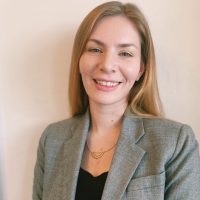
Global Seal of Biliteracy Q+A with Madeleine Sher
By Dr. Katherine Nelson
Last week I interviewed Madeleine Sher, our Assistant Director of Admissions & Outreach about her experience taking the exam to earn the Global Seal of Biliteracy. We talked about the registration process, testing experience, and technology requirements.

- Can you tell me what the registration process is like?
There were several steps to the registration process; first, I signed up through the LB website which was very simple! I provided my contact information and selected French as the language to test for. Shortly thereafter, I received an email from LanguageBird with information from AVANT including detailed instructions on how to set up to take the STAMP exam.
- So, you can take it at any time of the day, how does that work?
The email I received included a unique registration code to use to select my proctoring day and time. I could choose any day or time within the testing window, which spanned two weeks.
- What are the technical requirements and setup? Was it easy or difficult?
The tech setup was easier overall than I anticipated. You need a laptop or desktop with a webcam, a stable internet connection, and a smartphone.
I think it’s wonderful that students are required to do a practice test before the day of the actual exam. The practice exam allows you to go through both the tech setup and sample test questions to give you an idea of the day of the testing experience.
- What was the day of the process and testing experience?
The exam requires you to sit through the entire thing (which lasts about three hours) without getting up, eating, or drinking. I ate a full breakfast and drank plenty of coffee to prepare, just like I used to for long exams in high school and college.
Once the test time approached, I set up the proctoring service on my laptop and phone and verified my identity with a photo ID. I’d recommend making sure your phone is completely charged or having it sit on a charging stand during the test, as the front camera is on the entire time to monitor your activity.
To begin the exam, you choose either the reading or listening sections. I chose the reading section first, and I liked that you start with one of the passive elements of evaluation. It helped ‘wake up’ my French brain to better prepare for the speaking and writing portions.
- Did you encounter any technical issues in setup or while taking the test?
I very, fortunately, did not! When testing remotely, technology issues can certainly be a concern; you just never know what might happen. Some other students in my testing window did have to contact the proctor service’s tech support; they had to adjust some settings on their computers for the proctoring system to work. They had to do this on the testing day, right before testing. Though I couldn’t reach out to you during the actual test, it was reassuring to have you, Dr. Nelson, available to answer questions throughout the rest of the process!
- Is there anything that would have been helpful to know or do before the exam?
It was easy for me to prep for the reading and listening comprehension on my own, but looking back it would have been helpful to prep for the writing and speaking portions with a native-speaking tutor. If I take the test again to level up, I’d definitely take tutoring sessions to help improve my written and spoken French skills.
- What was your favorite part of the exam?
I think my favorite part of the exam was the adaptive questioning; the test adjusts itself to your level depending on whether your answers are correct or incorrect. It kind of gave me an idea as to how I was doing on the reading and listening portions!
- About how long was it until you got your results of the exam and then the Global Seal certificate?
I received my results about a week after completing the exam; evaluating the speaking and writing portions took a bit longer than the reading and listening comprehension sections. I received the actual seal (pictured below!) about 6 weeks after completing the test.
- Did you earn the certificate?
Yes!
- Congratulations! How did that feel?
It was incredibly meaningful to earn the Global Seal of Biliteracy! I spent so much of my academic career studying French and although it’s been a while since I’ve used French consistently, I’m proud that it’s stuck with me all these years. I really value my ability to speak and understand another language, and having the Global Seal of Biliteracy is a physical representation of all of the hard work I’ve put towards French.




